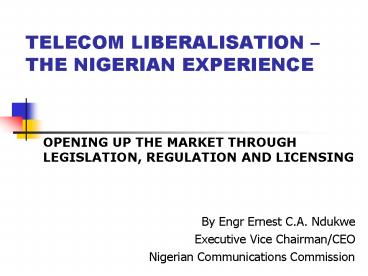TELECOM LIBERALISATION THE NIGERIAN EXPERIENCE - PowerPoint PPT Presentation
1 / 26
Title:
TELECOM LIBERALISATION THE NIGERIAN EXPERIENCE
Description:
CHARACTER OF THE PRE-LIBERALISATION ERA. Slow pace of Network Rollout ... Licensing of Fixed Wireless Access (FWA) Operators in 2002, (both national ... – PowerPoint PPT presentation
Number of Views:277
Avg rating:3.0/5.0
Title: TELECOM LIBERALISATION THE NIGERIAN EXPERIENCE
1
TELECOM LIBERALISATION THE NIGERIAN EXPERIENCE
OPENING UP THE MARKET THROUGH LEGISLATION,
REGULATION AND LICENSING
- By Engr Ernest C.A. Ndukwe
- Executive Vice Chairman/CEO
- Nigerian Communications Commission
2
Introduction
- Robust telecommunications infrastructure is
important for economic growth - Constitutes significant portion of world economy
- Revenue from Telecom services alone was estimated
at USD2.5 trillion as at 2004. - Improves productivity and efficiency in other
sectors
3
S1
- THE PRE-LIBERALISATION ERA
4
THE PRE-LIBERALISATION ERA
- Government ownership of a monopoly
telecommunications company. - Government funding of telecom infrastructure
development.
5
CHARACTER OF THE PRE-LIBERALISATION ERA
- Slow pace of Network Rollout
- Non-competitive equipment procurement procedures.
- Sub-optimal quality of service delivery.
6
RESULT
- Weak Infrastructure base
- Huge unmet demand
- Lines concentrated mostly in selected urban
centres - Slow growth of Subscriber base
- Limited investment into the Sector
7
Sector Reform
- Several countries, in the last two decades of the
20th century, identified that liberalisation of
Telecom market was essential for rapid network
Growth. - That private Sector participation was essential
for attracting financial resources, innovation
and new technology. - Nigeria thus embraced Market Liberalisation to
prosper.
8
BENEFITS OF SECTOR REFORM
We determined that Sector Reform will
- Improve services
- Eradicate misuse of monopoly powers
- Attract local foreign investment
- Encourage innovation and introduce advanced
services - Generate government revenues
- Increase sector efficiency through competition
- Extend services to underserved and unserved areas
9
ESSENTIALS FOR SUCCESSFUL SECTOR REFORM Contd
- Right policies and a good regulatory environment,
- Transparent and non-discriminatory access to
telecommunications resources. - Government commitment to reform essential and
must be total - Half-hearted reform measures limit inflow of
private capital required to accelerate network
expansion
10
S3
- CHARACTER OF TODAYS MODERN TELECOM SECTOR
11
TODAYS MODERN TELECOM SECTOR
- HAS
- Fully liberalised telecom market
- Governments role restricted to policy
formulation and sector regulation - A strong, independent Regulatory Authority
- Competition in all segments of the market
12
TODAYS MODERN TELECOM SECTOR CONTD.
- Minimal Government funding of telecom
infrastructure allowing resources to be available
for other sectors. - Massive Private sector investment to the sector.
- Improved availability and quality of service.
- Continuously innovating telecom environment with
introduction of new services on a continuous
basis.
13
S4
- ROLE AND IMPORTANCE OF THE REGULATORY AUTHORITY
14
ROLE OF THE NATIONAL REGULATORY AGENCY (NRA) IN
SECTOR REFORM
- Drive telecom sector reform by
- Promoting market liberalisation
- Licensing of competitive operators
- Introducing and maintaining transparent
regulatory processes - Attract investment
- Protecting new entrants from dominant operators
- Protecting consumer rights and interests
- Encouraging new and advanced services
- Speedy and equitable dispute settlement
15
Key Success Factors For a Regulatory Authority
- Good enabling Laws
- Government Support
- Independence
- Adequate Manpower
- Adequate Funding
- Wide Consultations
- Positive, Bold and timely Regulatory Decisions.
16
S5
- THE NIGERIAN EXPERIENCE
17
The Journey
- Regulatory body, the Nigerian Communications
Commission (NCC), was established by law in Nov.
1992. - Commenced operation in mid 1993 with the
inauguration of the first Commission. - Commenced full market liberalisation and Sector
Reform in 2000.
18
The Journey Contd.
- The last few years have seen a notable increase
in private sector involvement in the Nigerian
Telecommunications Industry with the - Successful auctioning of the 2G Digital Mobile
Licenses in January 2001(Total of four GSM
licenses issued). - Licensing of Fixed Wireless Access (FWA)
Operators in 2002, (both national regional
licenses issued). - Licencing a Second National Carrier in 2002.
- Preparation of the Incumbent Operator for
privatisation.
19
The Journey Contd.
- Several Internet Providers licensed to encourage
fast growth of Internet nationwide. - The Regulatory Body has been strengthened, and is
receiving full support from the government. - A National Telecom Policy (NTP) released in
September 2000.
20
CHALLENGES
- CURRENT ISSUES
- Interconnectivity
- Effective Competition
- Monitoring, Compliance enforcement
- Consumer Education Managing Consumer
Expectation - Institutional Strengthening
- Unreliable Electricity Supply
21
The Nigerian Market- Score Card
22
The Nigerian Market
- The deregulation and liberalisation of the
telecom industry has brought with it a lot of
advantages for the Nigeria economy - The economic benefits include attracting new
investments, providing needed infrastructures and
creating innovative services - Investment in telecommunications tends to trigger
an economic chain which in the case of Nigeria
has positively impacted other sectors of the
economy
23
The Nigerian Market Contd.
- THREE YEARS OF TELECOM SECTOR REFORM HAS BROUGHT
ABOUT - ? Substantial private sector investment
- ? Increase in number of market players
- ? Unprecedented Growth in the Network
- ? Expanded geographical coverage
- ? Empowerment of the citizenry
- ? Employment Creation
- ? Economic Stimulus
24
The Revolution
- A revolution has indeed taken place in the
Telecom industry in Nigeria - Nigeria has become one of the fastest growing
markets in the world for mobile communications.
25
2001 to 2004
- It all started in year 2001 and by 2004 the
network has grown from 0.5m lines to 10m lines
representing a 20 fold increase in 3 years
26
END
- I Thank You all .































